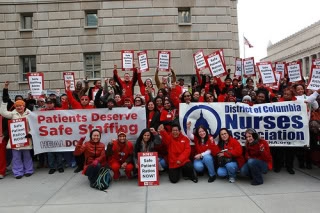- Community
-
Programs
- Schools
-
Careers
- RN Specialties
- Best RN Jobs and Salaries
- Aesthetic Nurse
- Nursing Informatics
- Nurse Case Manager
- NICU Nurse
- Forensic Nurse
- Labor and Delivery Nurse
- Psychiatric Nurse
- Pediatric Nurse
- Travel Nurse
- Telemetry Nurse
- Dermatology Nurse
- Nurse Practitioner
- Best NP Jobs and Salaries
- Family NP (FNP)
- Pediatric NP
- Neonatal NP
- Oncology NP
- Acute Care NP
- Aesthetic NP
- Women's Health NP
- Adult-Gerontology NP
- Orthopedic NP
- Emergency NP
- Psychiatric-Mental Health NP (PMHNP)
- APRN
- Nurse Educator
- Nurse Administrator
- Certified Nurse Midwife (CNM)
- Clinical Nurse Specialist (CNS)
- Certified Registered Nurse Anesthetist (CRNA)
- Resources
- Education


jrsRN07
34 Posts
D.C. Hospitals And Nurses Fight Over Staffing Ratios - Kaiser Health
By David Schultz
Feb 22, 2013
Hospital administrators in Washington, D.C., are furiously lobbying against a bill modeled on a California law that would require them to maintain a minimum nurse-to-patient ratio at all times.
Nursing unions say the proposed Patient Protection Act codifies into law minimum staffing levels that are needed to maintain patient safety, while hospitals say the cost of hiring new nurses to comply with the law would put them out of business.
The ratios called for in the bill vary depending on the hospital department. In a pediatrics unit, the bill would require no less than a 1-to-4 nurse-to-patient ratio. In the operating room, hospitals would have to maintain a 1-to-1 ratio -- one nurse for every patient at all times.
Deidre Beckford, a nurse at MedStar Washington Hospital Center who has worked there for more than 20 years, says understaffing has forced her to take care of five to six patients at a time. ...
The nursing bill in D.C. would reduce some of this fluctuation. It's modeled after a nearly identical law that took effect in 2004 in California, the only state to require minimum staffing ratios in its hospitals. So far, it's unclear whether this requirement has had a positive or negative effect in California hospitals.
Studies have shown that the law has led to an increase in nurse hiring in California and a decrease in nurse turnover due to burnout. But researchers also found that the law put significant financial pressure on some hospitals. ...